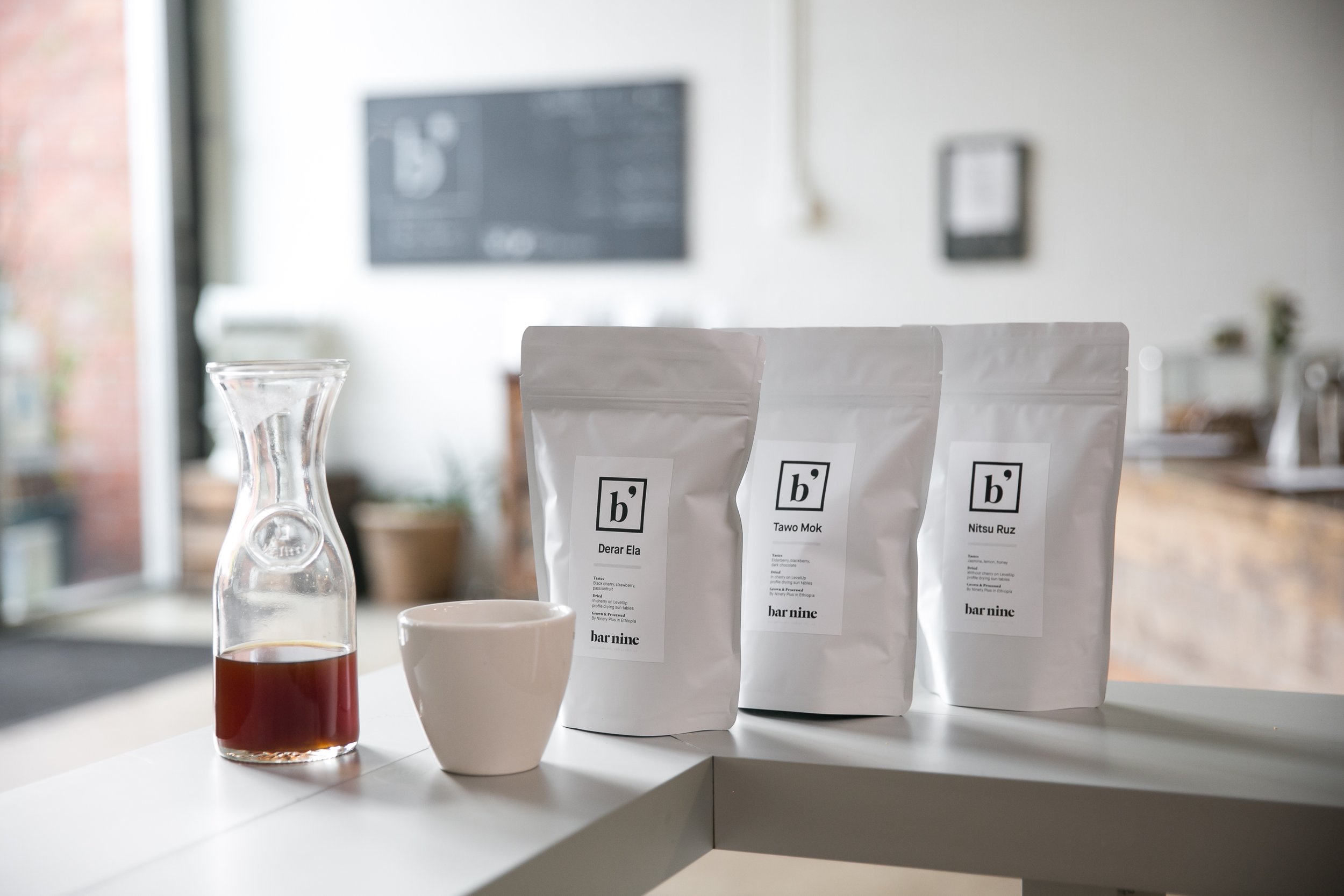Mug in Hand, To Church We Go
In Atlanta, roasters and churchgoers and mingling the sacred and everyday: coffee, community, and faith.
Roaster Brian Holland of Firelight Coffee
Brian Holland prayed for a roaster for 18 months. Not just any roaster. He wanted a $30,000 Probat P12, because he heard they were easy to use and impossible to break. In 2007, Holland was called to launch Phoenix Community of Atlanta, a ministry that serves the city’s broken and downtrodden citizens.
As the recession deepened in 2008, funding for Phoenix dried up, and Holland didn’t have an affluent membership base to turn to. “We joked about it. ‘There are two things that bring people together: beer and coffee. Monks are brewing great beer. Let’s see if we can roast coffee.’ Of course, we knew nothing. We didn’t understand the travesty of farmers’ wages in Central and South America. We just needed to resource our dream of supporting Phoenix people,” says Holland.
In 2010, Holland shared his vision for a coffee roasting church with a young minister, Hunter Lambert, who was on his way to Israel. It turns out Lambert was storing a roaster for a Nicaraguan coffee farming family, who had briefl y set up a roastery in California after fleeing violence at home. Lambert drove Holland to a storage unit four miles away, opened the door, and revealed the roaster. Not any roaster. It was a Probat P12.
Holland and his team flew to Nicaragua to meet the family, and they agreed to let the ministry use the roaster. They loved Jesus and knew what it felt like to live in uncertainty. Holland roasted his first batch of coffee in 2010, and, four years later, Phoenix bought the Probat P12 outright.
In 2018, Phoenix Roasters will finally reach profitability. They’re projected to roast 5,000 pounds of beans a month—destined for churches and businesses across the country—and they’re partnering with the Atlanta Breakfast Club on branded cafes. Phoenix Roasters’ growth dovetails with third wave coffee nationally, and from its success, Holland and his team have opened four brick-and-mortar Phoenix ministries (with two more on the way this year and a goal of 20). “God’s hand is on us,” says Holland.
Firelight Coffee Roasters was also born at church. Todd Johnson and Ryan Harlan met at Grace Midtown Church in Atlanta. They attended services, played music together on the weekends, and participated in small group study. Johnson had been roasting beans at home for a few years, and when he brewed his coffee for Harlan, his friend encouraged him to roast for a wider audience.
In 2014, Grace Midtown set up an artists’ market for the holiday season, and Johnson and Harlan roasted a big batch of coffee during Thanksgiving to brew at the event. “We sold the coffee in Mason jars, and everybody loved it. It was the launch of our business. We didn’t even have a name yet,” says Harlan.
Firelight Coffee Roasters
Firelight Coffee Roasters
Fifteen hundred to 2,000 people attend Grace Midtown every Sunday, and soon the church started exclusively serving Firelight Coffee, as Johnson and Harlan eventually dubbed the company. Grace Midtown already took its coffee program seriously. It has a devoted cafe space next to the auditorium with big batch brewers for drip coffee—a fairly routine amenity for larger congregations. “There’s a team of volunteers who love coffee, and they brew for services. Anyone who’s attending brings their own mug, fills it up, and walks to the church service,” says Harlan.
To make sure their coffee shined, Harlan and Johnson attended every service for two months. “We bought them a grinder so they could do whole bean. We pre-portioned coffee for one pot, wrote out instructions, and taught people how to brew correctly. They had signs out with our names and branding, and we wanted to be well represented,” says Johnson.
Harlan and Johnson are now selling 50 pounds of beans a month to Grace Midtown. They also converted Crossroads Church in Newnan—with its 1,000-plus seat auditorium—from retail Starbucks to its beans, a quality upgrade and, ultimately, a cost-savings for the ministry.
“Churches reflect the growth of coffee culture, in general. It’s not separate; they’re part of it. People attending church are trying and drinking good coffee, and they’ll let people making purchasing decisions know that there are other affordable options, rather than mass produced,” Harlan says.
Rising Star Roaster Jared Karr of East Pole Coffee Co. sells single origin coffees to Sojourn Church and Resonate Church, and is a member of the latter. Passioncity, whose ministry reaches audiences of 12,500, buys a large number of East Pole retail bags for staff gifts. “It’s pretty common to find well brewed and well-roasted coffees all around Atlanta inside churches,” says Karr. Churches aren’t a big target for East Pole’s growth, and they only represent a fraction of sales. As a churchgoer and roaster, though, it’s the mingling of the sacred and the every day: coffee, community, and faith.
Even roasters who admittedly don’t attend Sunday services sell to churches. Athens, Georgia, roaster 1000 Faces sells its Aldo’s and Bell’s blend—the latter named for feminist and social activist, Bell Hooks—to Calvary Chapel, Victory World Church, and Redeemer Presbyterian in Atlanta. Radio Roasters supplies All Souls in Decatur.
For Holland, the connection between coffee and faith communities starts with the farmers. He initially considered buying land in Central or South American to grow his own beans, but a lifetime missionary, Perry Walker, set him on a different path. “He said, ‘Let me get this straight. You want to buy cheap land and use cheap labor to produce a cheap product. How does that help these communities? Indigenous, Jesus-loving farmers are growing the best coffee in the world. Do fair business with them.”
East Pole Coffee Co.
Roaster Jared Karr of East Pole Coffee Co.
Using the same quality standards as other third wave roasters, Phoenix sources coffee direct trade from “generationally generous, Jesus-loving families,” and they work with farmers to improve their crops and processing systems when they don’t meet a minimum 82-point bean score. “We have friends all over the world going on missions, and I always tell them, ‘Look for the man of peace dealing with coffee,’” says Holland. Like his peers nationally, Holland sees the immediate impact Phoenix has on his farmers. “In the areas where we are, the farmer gets more money, and his migrant fi eld hands are paid more. Their kids stay in school longer, they have better medical care, and they can study vocations and stay in the country they love.”
That realization is powerful whether you’re a minister or a socially conscious consumer. Great quality coffee also changes lives. For Holland that happens on both sides of the equation. His farmers have more opportunity, and the profits from Phoenix Roasters’ coffee brings hope to people on the margins—not to mention its power to wake up congregants up on Sunday mornings.
Atlanta is Southern and largely Christian by heritage; it’s also cosmopolitan with Fortune 500 companies plumping up the city’s economy and luring young professionals to town. “Church has evolved over the past decade or two. I think churches like Grace Midtown sense what people want and need from their communities. They get them in the door, and help them be comfortable,” says Johnson, whose faith community leans more millennial than boomer.
Young Christians, who also happen to love exceptional coffee, are demanding more from their churches’ coffee programs. “I know a lot of older pastors who stand up and rail against millennials. Then they hand them a crappy cup of coffee when they come to church. The millennial thinks that you’re either ignorant and you just don’t know. Or you’re insidious. You do know better and you don’t give a crap. [Coffee] is an economic decision,” says Holland. “I would rather you serve water before you serve coffee that smells like human trafficking.”









